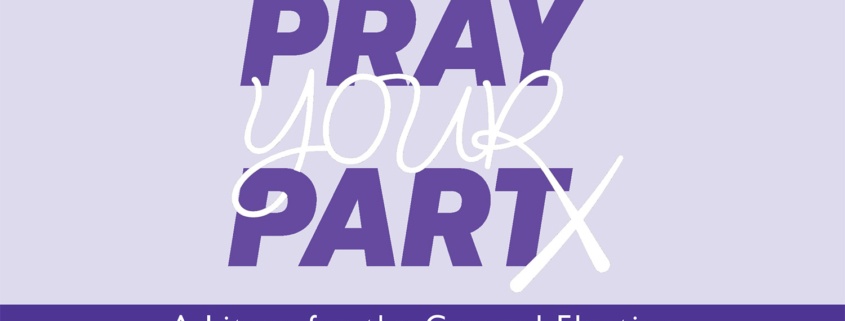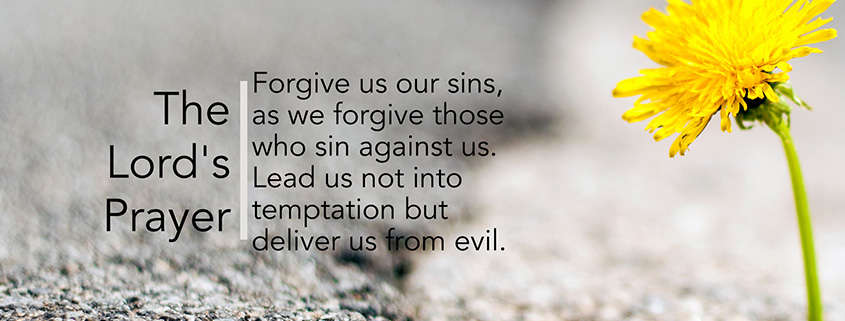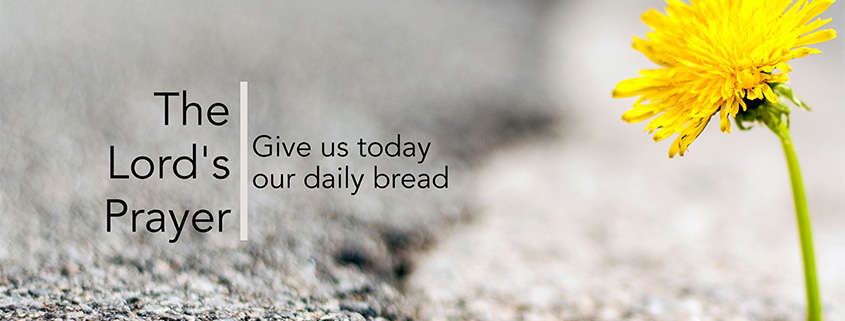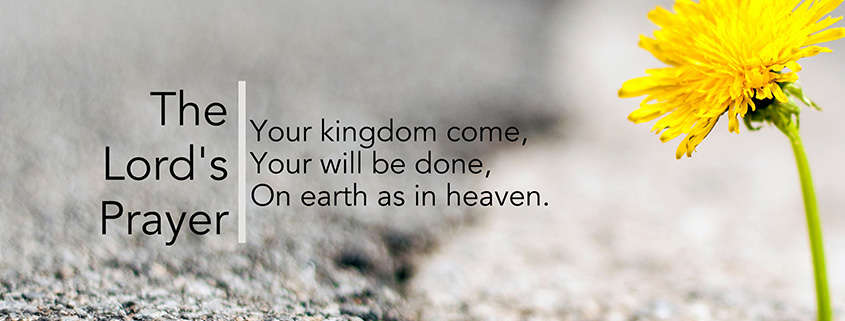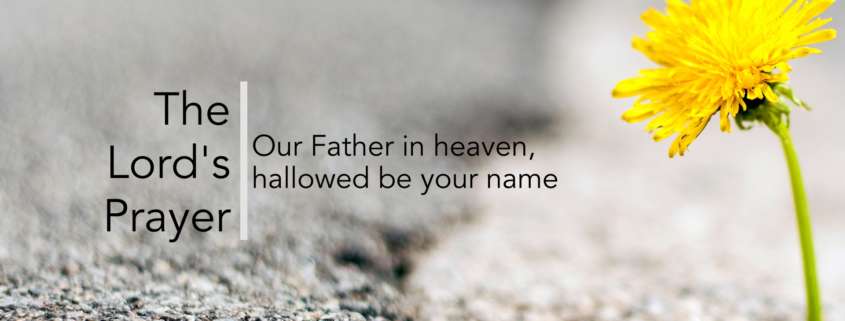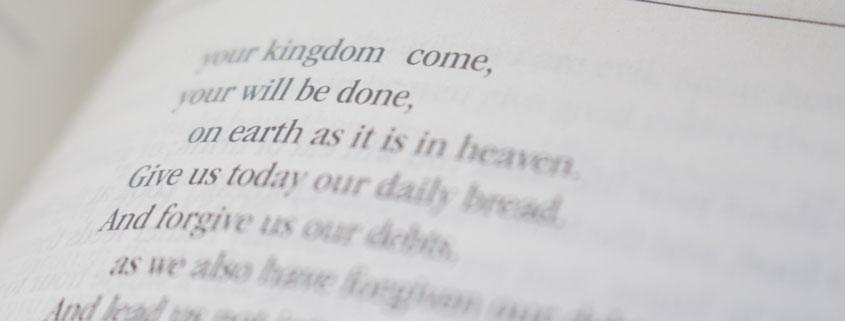With the UK General Election on the horizon, Bishop Steven urged Diocesan Synod to pray for the nation.
Posts
Part of the mystery of being human is that we make mistakes – that the darkness in the universe flows through us all.
In hard times, and those times when we’re finding our way, the Lord’s Prayer is a source of strength and courage – a reminder to bring our whole selves to God, good bits and bad.
Revisit the journey so far at oxford.anglican.org/come-and-see
Our thanks to Edith Grindley from St Frideswide’s, Water Eaton, for the Lord’s Prayer in British Sign Language.
We are bombarded 24/7 by adverts with just one aim – to make us unhappy with what we have. Our relationship with stuff has gone badly wrong, and our greed is destroying this fragile planet.
Six words contain the secret to happiness in a world in crisis – a prayer to shape our hearts, to make us content with just enough.
Catch up on the journey so far at oxford.anglican.org/come-and-see
Every day the news reminds us of the threads of evil in the world. But the difficult things in life are not the end of the story.
The second line of the Lord’s Prayer is our commitment to being part of the solution – a pledge to play a role, however small, in the mission of God’s kingdom.
Catch up on the journey so far at oxford.anglican.org/come-and-see
Soon we’ll be able to see further out into space than ever before. But as we look further out, we can feel increasingly lost. What’s our place in this ancient and expanding universe?
Your life is not some kind of cosmic accident. You do have a place in this world. The first line of the Lord’s Prayer can help you find it.
This is the first of the Come and See weekly films from Bishop Steven. It accompanies daily email reflections throughout Lent. Join us.
Most of us learn the Lord’s Prayer as children. But then we forget what it means. Over the last few weeks I have found myself teaching the Lord’s Prayer to several different congregations – over 2000 people in all, including many young people.
We live in a world and a country with poor mental health. Yesterday the government announced £300 million new funding for children with mental health measures. It’s welcome but already people are saying it won’t be enough.
There is increasing evidence that our consumer culture actually undermines mental health, especially in the young, and creates a deeply demoralised society prone to depression and other mental health conditions[1].
Jesus gives his disciples a prayer not to teach them to be pious but to help people everywhere to live well and flourish.
Here are seven reasons why the Lord’s Prayer is good for mental health – seven reasons to say the Lord’s Prayer, as Jesus intends, every day.
- To remember who you are
Our Father in heaven, hallowed by your name
To say the first line of the Lord’s Prayer is to answer the deep question of identity at the heart of our culture. We no longer know who we are.
The first line of the Lord’s Prayer reminds us that we are not random specks of matter floating through an infinite universe: we are created and called into relationship with our creator who loves us as a parent loves their child. We are called into relationship with our fellow men and women as sisters and brothers. You are loved and your life has meaning.
- To find courage to live well in an imperfect world
Your kingdom come, your will be done on earth as in heaven
The world is not yet as it was intended to be. God is at work within it, bringing justice and peace. That work was begun in Jesus Christ but is not yet complete.
We are aware of the suffering in the world like no other generation before us because of 24-hour news and instant reporting from anywhere in the world. We need a framework to understand that immense suffering and the evil in the world in order to know how to live.
- To find the only way to be content
Give us this day our daily bread
All year we are bombarded by advertising: every time we look at a screen or listen to the radio or open a magazine. The single aim of advertising is to steal our joy and create discontent and longing for more stuff or different experiences.
Jesus teaches his followers to pray each day not for more but for just enough. This is the open secret of what it means to be content and find joy in this life: to realise and appreciate what we have. This line alone is the antidote to the misery created by consumer culture (especially at this time of year).
- To learn to live with our imperfections
Forgive us our sins….
Sins are the ways in which we fall short of the ideal. All of us do that. But our culture creates expectations of perfection. We think we are supposed to look good, perform well, make a great impression in every moment of our lives.
Jesus gives us a prayer to say every day which simply acknowledges that we fall short – we are not perfect people. Each day we can come to God and ask forgiveness and seek help and strength for the day.
- To learn to live with the imperfections of others
….as we forgive those who sin against us
The Lord’s Prayer reminds me that other people are imperfect as well. I need a way to deal with my own rubbish and with theirs. Otherwise all my relationships will be spoiled and clogged up and I will increasingly be alone (which is actually what happens to people who are unable to forgive). Somewhere near the root of many mental health conditions is isolation.
Jesus offers us this prayer to say each day in which I let go of and forgive the things others have done to me: the small slights, the neglect, the careless words, and begin again.
- To be resilient in a challenging world
Lead us not into temptation but deliver us from evil
Consumer culture eats away at our resilience by persuading us that life should really be comfortable and easy all the time. That is one of the deepest lies ever told.
Human life is difficult. Over the course of your life you will face many challenges: illness, adversity, relationships which go wrong, failure and, in the end, mortality.
To live well is to have an understanding that life is challenging and hard, because of the imperfections in the world, in yourself and in others. But strength and help are available in God in all circumstances.
To pray the Lord’s Prayer each day is to prepare yourself for whatever difficulties lie ahead.
- To understand the end of the story
For yours is the kingdom, the power and the glory, for ever and ever, Amen.
This part of the prayer was added by the Church. It’s not there in the two places in the Bible where Jesus teaches the Lord’s Prayer (in Matthew 6 and Luke 11). It takes us back to the beginning. It reminds us that a life lived well is a life lived with purpose to the glory of God.
It reminds us that in the end, God holds the end of the story. God will bring all things to completion. God will watch over us through this life and welcome us, beyond death, into the life to come. That God is over all and in everything and all manner of things shall be well.
Most of us learn the Lord’s Prayer as children but never fully understand what it means. It’s impossible to exhaust all the meaning in the prayer.
But say it, if you can, every day of your life to remember your identity, to find courage, to learn contentment, to live with your imperfections and those of other people, to build resilience and to understand the end of the story.
+Steven Oxford
[1] See John F Schumaker, The Demoralised Mind, New Internationalist, April, 2016 https://newint.org/columns/essays/2016/04/01/psycho-spiritual-crisis
This is my presidential address from the Sheffield Diocesan Synod held today in Handsworth on the edge of Sheffield.
Give us this day our daily bread Presidential Address to the Sheffield Diocesan Synod 13th July, 2013.
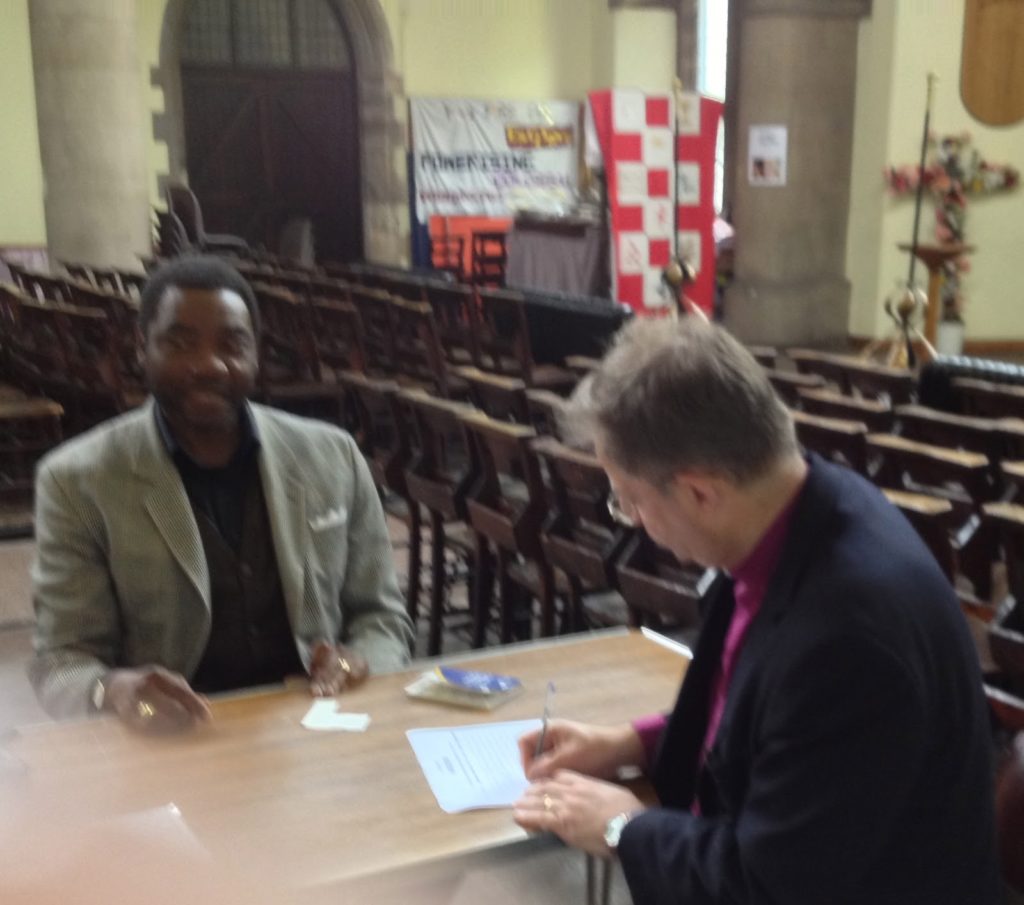 A few weeks ago I visited the food bank at St. Cuthbert’s Fir Vale in Sheffield. The food bank opened at the end of 2011. It served two people in its first week. The food bank now serves up to 50 single people and 15-20 families every week.
A few weeks ago I visited the food bank at St. Cuthbert’s Fir Vale in Sheffield. The food bank opened at the end of 2011. It served two people in its first week. The food bank now serves up to 50 single people and 15-20 families every week.
The volunteers walked me through the process of registration as if I had come to use the food bank. They gave me a warm welcome, asked me a number of simple questions and explained what was on offer. I was invited into a café area of the church for tea and coffee with snacks for my children. It was all very small scale, neighbourly and human and, of course, set in a church building.
I was taken behind the scenes and asked to pack some bags for distribution. Each bag contains tea or coffee, some breakfast cereal, some protein and carbohydrate, a treat of some kind, some long life milk. The cash value at the supermarket would be £1.80.
The food comes from a wide range of 25 organisations who collect it, from grants and individuals. The food goes to people who live in the area, who really need it, who would actually be hungry without it. There is absolutely no doubt about that. For whatever reason, some people are now genuinely hungry in our society. The food is distributed through a network of volunteers, many of them trained in food hygiene and healthy eating. The food bank is now at the centre of a city wide network of community and support.
Most of us will know that food banks are growing apace in our society at the present time. The Fir Vale food bank is an excellent example of the Church being salt and light in our community and reaching out to those in need. We believe that there are around 15 church based food banks in Sheffield who are part of the Sheffield Food Bank network. Rotherham has the Food for People in Crisis Partnership. We know of 7 church based food banks in Doncaster and that number is rising. The food bank at St. James Balby featured in a recent Guardian article. I was in one of the Barnsley deaneries on Wednesday and heard of two groups of churches preparing new food bank initiatives – a simple response to the need the churches see around them.
According to Church Action on Poverty and Oxfam figures released a few weeks ago, around half a million people used food banks in the UK last year. There are a number of interrelated reasons for this rise. We all know the cost of food and fuel are rising. More families are living close to crisis and when the crisis comes have fewer financial resources. Delays or failures in the administration of benefits can have a huge impact on vulnerable families. The changes to the benefits system are likely to sharpen the impact still further.
I would guess that many of the parishes across our Diocese are caught up in these changes in some way whether we are collecting food, offering it in very simple ways or exploring some larger venture. It is often as simple as a box with a collection point on Sundays for canned goods which is kept by the vicarage door for those in need. Often the food banks are ecumenical projects: churches acting together in God’s mission. With many others in our society, we are deeply moved that someone in the next street or on the other side of town could be physically hungry. We are moved still more that children should be without food in Britain in the 21st Century. We are disturbed that there should be such a divide between the haves and have-nots.
We are called as a Diocese to grow Christ-like communities. Christ-like communities respond with compassion to the needs around them and that is exactly what St. Cuthbert’s Fir Vale are doing along with many other churches and congregations.
Local churches are well placed to be channels of that practical support in times of need. We are close to the ground. We are in every place. We can mobilise volunteers. We have buildings and resources to offer. Every local church is part of a wider network in the diocese and ecumenically. We can draw on expertise in finding out how to do this. There is no doubt that local churches are leading the way in food bank provision across this area.
We are called as a Diocese to grow Christ-like communities which are effective in seeking to transform our society and God’s world. Exactly one year ago we agreed our salt and light strategy at this July Synod. It was formally launched at our Development Day in October of last year. The growing need for food banks shows us how vital that part of our strategy is for the church and for the region. But Salt and Light encourages us to go further than simple practical support, vital though that is.
We need to pray and think and reflect about what is happening. We need to reflect on what this change says about the society and the world we live in. We need to be challenged ourselves and we need to challenge others. What does it mean that some are needing food aid in our own society and our own towns and city? How can we not only serve our neighbours but work for change in this area?
As everyone here knows, Jesus gives his disciples a prayer. We call it the Lord’s Prayer. We use it every time we gather. We know it by heart. We pray it from childhood to old age. It is the most profound and wonderful prayer ever composed.
In the very centre of the Lord’s Prayer we find a prayer centred on food. Give us this day our daily bread. It is a prayer asking for the basic necessities of life. Yes, of course, bread is much more than food. We are asking for spiritual nourishment as well as physical food. But it is a prayer for physical food.
I’ve come to realize that one of the reasons the Lord gives us this line of the prayer is to teach us to be content with enough. I began by thinking that the prayer is at heart a petition. This is the moment when I ask for things for myself in prayer. It’s not wrong to do that but I don’t think the emphasis lies here.
For the prayer encourages me to ask God not for wealth but for just enough for this day – to seek God daily for daily bread. This line of the prayer has become for me a prayer to God to hold in check my own natural greed and desire not only for more food but for more material things, more of this world’s goods. This simple line of the Lord’s prayer is a powerful antidote to greed and materialism. It is a pathway to being content with what we have – with saying that enough is enough.
This is something, I believe the Church needs to teach again more clearly in our communities. I am not an economist and I don’t understand all that is happening in our society at the present time. But we do stand in a profound moment of change. That change is being driven by personal greed, corporate greed and national greed. It is driven by the message that more wealth and more goods and more food means more happiness. That message has been proclaimed at every level in our society for generations. It is proclaimed through our politics and education systems. It is proclaimed through advertising. It is proclaimed through every part of popular culture: you cannot be happy unless you have more.
The Church needs to proclaim a different message, to sing a different song. The message that wealth and possessions bring happiness is, simply, a lie. Christ’s love sets us free from the chains of our own greed and slavery to possessions. “Is not life more than food and the body more than clothing?” (Matthew 6.25) The Christian Way is about learning to be content with enough. Give us this day our daily bread. We learn to see in ordinary things the surpassing generosity of God.
That message in turn liberates us and sets us free to be generous: to share with others what God has given us. The message creates in us as Christians a strong desire for justice. We do not see why we should live in an unequal world.
The message drives us to campaign for an end to world hunger. World hunger is created and sustained by institutionalized greed. There is enough food for everyone but some are denied because of the greed of others to consume. The Enough Food/IF campaign this year has argued for serious structural change to help the world’s poorest people – those who are starving and malnourished in the very poorest countries. Christians and Christian aid agencies have been in the forefront of that campaign. There has been real progress.
Back in the 1970’s, the aid agencies began a campaign to persuade the UK government to spend 0.7% of GNI on aid. The UK government reached that target this year. G8 leaders pledged an extra $4.1 billion to help tackle malnutrition and save the lives of almost two million children. Land grabs were on the G8 agenda for the first time ever. Fairer systems for buying and selling land in developing countries are key. There has been significant progress in combatting the avoidance of tax by multinational companies both in the UK and in the G8 countries.
The message of the Lord’s Prayer should stir us up to do something about the scandal of food waste. According to the love food hate waste website, about 15 million tonnes of food is thrown away every year. Around 50% of this comes from our homes. Some of this colossal food waste of that is in our own kitchens and dining rooms. The evidence of greed is in our rubbish bins.
The Christian Church and some other faith communities have long held to the practice of fasting. One of the purposes of fasting is to check greed and to help us reconsider our relationship with food. All of us will know that the Muslim community began Ramadan this week – a whole month of a different rhythm and connection between the community and what we eat and drink. Throughout the twentieth century, the Christian church weakened its practice on fasting. The time has come in the 21st Century to restore the discipline as part of our discipleship.
The message of the Lord’s Prayer leads us to celebrate the connections between people created through food through food festivals, allotment projects, teaching people greater skills in cooking, helping families to recover the tradition of eating together around a table instead of in front of the television or the smartphone. It’s not only about how much we eat but how we give thanks for and celebrate God’s gifts to us in food and drink. It should be about tackling overconsumption of food and rising levels of obesity in many sections of society. Concern for food leads naturally to concern for our environment, to questions of animal welfare, of fair trade, of concern for the farmers who produce food in many parts of this diocese, to making the most of what we have.
Jesus teaches us to pray: Give us this day our daily bread.
The only path to a better world is to find an antidote to human greed. I know of no antidote to that greed than the gospel of Jesus Christ which sets men and women free from the need to get more for ourselves and to give more to others.
I want to thank God this morning for all the churches across this diocese who are involved in helping the hungry, through food banks, collection and distribution of food, soup runs, homeless shelters, through collecting for Christian Aid, through joining the IF campaign, through allotment projects, through teaching people about growing food or food preparation, through food festivals. There is a growing need around us. There is plenty of scope for more churches and people to be involved.
In all of these ways, we bear witness to the love of Christ and we are salt and light in our communities.
Give us this day our daily bread.

